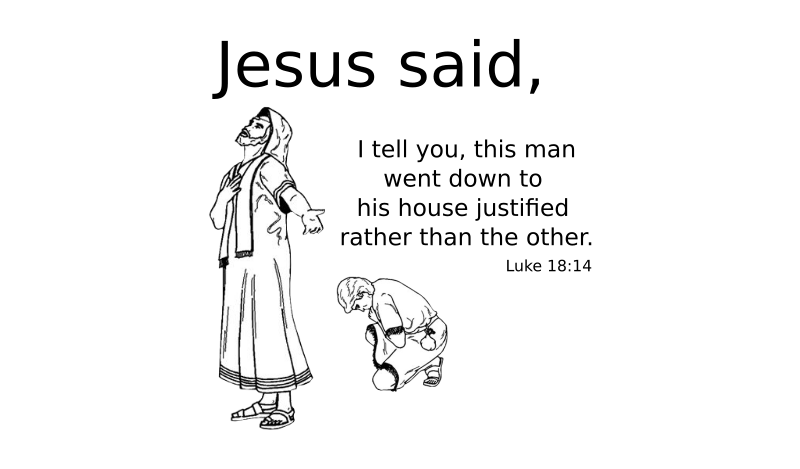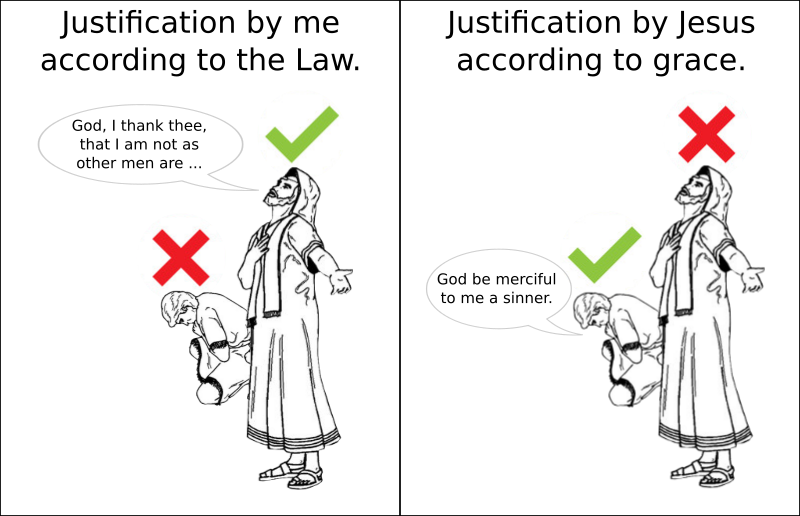Galatians 2:15-21 New American Standard Bible (NASB)
15 “We are Jews by nature and not sinners from among the Gentiles; 16 > nevertheless knowing that a man is not justified by the works of [a]the Law but through faith in Christ Jesus, even we have believed in Christ Jesus, so that we may be justified by faith in Christ and not by the works of [b]the Law; since by the works of [c]the Law no [d]flesh will be justified. 17 But if, while seeking to be justified in Christ, we ourselves have also been found sinners, is Christ then a minister of sin? May it never be! 18 For if I rebuild what I have once destroyed, I prove myself to be a transgressor. 19 For through [e]the Law I died to [f]the Law, so that I might live to God. 20 I have been crucified with Christ; and it is no longer I who live, but Christ lives in me; and [g]the life which I now live in the flesh I live by faith in the Son of God, who loved me and gave Himself up for me. 21 I do not nullify the grace of God, for if righteousness comes through [h]the Law, then Christ died needlessly.”
I understand that most of the verses above emphasizes that it is Not legalistic laws that justify us before the Lord. It is faith in Jesus Christ that justify us before the Lord. However, I do Not understand the verses below that are found in the midst of the the other verses above. Could someone please elaborate on the meaning of the verses below?
Galatians 2:17-19 New American Standard Bible (NASB)
17 But if, while seeking to be justified in Christ, we ourselves have also been found sinners, is Christ then a minister of sin? May it never be! 18 For if I rebuild what I have once destroyed, I prove myself to be a transgressor. 19 For through [a]the Law I died to [b]the Law, so that I might live to God.
Why would we think that seeking to be justified by Jesus Christ would somehow suggest that we are found to be sinners?
How is rebuilding things that we destroyed show us to be transgressors? What does it mean when it says "through the Law I died to the Law" ?
Here is the Greek:
Galatians 2 (WH) / [NA27 variants] 15Ἡμεῖς φύσει Ἰουδαῖοι καὶ οὐκ ἐξ ἐθνῶν ἁμαρτωλοί, 16εἰδότες δὲ ὅτι οὐ δικαιοῦται ἄνθρωπος ἐξ ἔργων νόμου ἐὰν μὴ διὰ πίστεως Χριστοῦ ⇔ Ἰησοῦ, καὶ ἡμεῖς εἰς Χριστὸν Ἰησοῦν ἐπιστεύσαμεν, ἵνα δικαιωθῶμεν ἐκ πίστεως Χριστοῦ καὶ οὐκ ἐξ ἔργων νόμου, ὅτι ἐξ ἔργων νόμου οὐ δικαιωθήσεται πᾶσα σάρξ. 17εἰ δὲ ζητοῦντες δικαιωθῆναι ἐν Χριστῷ εὑρέθημεν καὶ αὐτοὶ ἁμαρτωλοί, ἆρα Χριστὸς ἁμαρτίας διάκονος; μὴ γένοιτο· 18εἰ γὰρ ἃ κατέλυσα ταῦτα πάλιν οἰκοδομῶ, παραβάτην ἐμαυτὸν συνιστάνω. 19ἐγὼ γὰρ διὰ νόμου νόμῳ ἀπέθανον ἵνα θεῷ ζήσω· 20Χριστῷ συνεσταύρωμαι· ζῶ δὲ οὐκέτι ἐγώ, ζῇ δὲ ἐν ἐμοὶ Χριστός· ὃ δὲ νῦν ζῶ ἐν σαρκί, ἐν πίστει ζῶ τῇ τοῦ υἱοῦ τοῦ θεοῦ τοῦ ἀγαπήσαντός με καὶ παραδόντος ἑαυτὸν ὑπὲρ ἐμοῦ. 21Οὐκ ἀθετῶ τὴν χάριν τοῦ θεοῦ· εἰ γὰρ διὰ νόμου δικαιοσύνη, ἄρα Χριστὸς δωρεὰν ἀπέθανεν.

